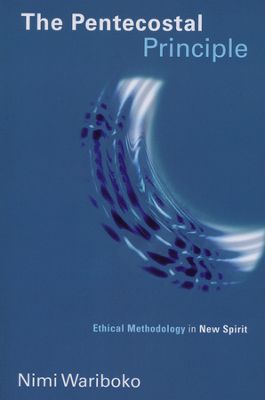Nimi Wariboko’s The Pentecostal Principle, reviewed by Paul Palma
 Nimi Wariboko, The Pentecostal Principle: Ethical Methodology in New Spirit, Pentecostal Manifestos 5 (Grand Rapids: Eerdmans, 2011), 235 pp. + xii, ISBN 9780802866974.
Nimi Wariboko, The Pentecostal Principle: Ethical Methodology in New Spirit, Pentecostal Manifestos 5 (Grand Rapids: Eerdmans, 2011), 235 pp. + xii, ISBN 9780802866974.
The “Pentecostal Manifestos” series is designed for a rising and outwardly-focused generation of Pentecostal scholarship. In this the fifth book of the collection, Nimi Wariboko, Katherine B. Stuart Professor of Christian Ethics at Andover Newton Theological School, provides a tightly written, appropriately focused book on humanity, transformation, and flourishing. In this book Wariboko carefully delineates the position between permanence and absence.
The book is divided into five parts. The first chapter providing a platform on which the central thesis of a Pentecostal Principle is established. Chapter two explains the methodology of an ethical approach. In the third chapter, Wariboko lays out the central paradigm informing his methodology; what consists in the ‘plurivocality’ of Pentecost. The fourth chapter uncovers the ontological dynamics of the Pentecostal principle, namely, the ‘Pentecostal Spirit.’ Finally, concerning the promise and future trajectory of the Pentecostal Principle, Wariboko suggests that the best way forward is a theology of play. A theology of the Holy Spirit concerned primarily with questions pertaining to pneumatic existence and the interior dynamics of the pneumatological imagination.
Wariboko builds principally on the Tillichian school of thought, meaning an analysis of the inter-connectedness of theology and economics. In this respect Wariboko draws on the principle of a new ethic and spirit for Christianity. Undergirding Wariboko’s position is an emphasis on the ‘theology of play,’ signifying creativity and lack of social conformism. This thesis is sustained and energized by a theology of the Third Article and the continuing, ongoing, mediated presence of Holy Spirit baptism. The lasting criterion of a Tillichian Protestant approach is emphasis on the divine-human relationship and the synthetical association between this principle and universality (Catholicity) of culture and existence.
Perhaps there is what Wariboko calls a Protestant ‘kairiotic’ approach, but there is indeed a gap between this reality and the function (signature) of existence. My one critique would be that the relationship between permanence and transience (finitude) is not always immediately evident; nevertheless, this hardly points to a methodological flaw. The work’s strength is Wariboko’s concerted effort to establish a connection between ‘particularity’ (individuality) and Catholicity. More than anything, a renewal methodology, rooted in the Pentecostal Principle is a “reflective response,” consisting in necessity and the interior crises of pluralism (129). The grace of the self-giving God is a genuine grace, freely given and freely received.
Reviewed by Paul J. Palma
Category: In Depth


